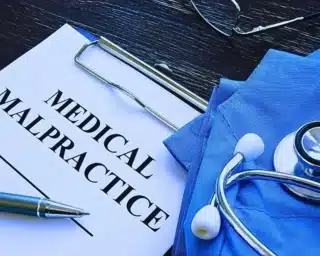
You may file a product liability claim against the manufacturer, doctor, hospital/clinic, or retail supplier if you were injured or suffered losses due to a defective medical device. Defective medical devices may include ventilators, stents, pacemakers, and insulin pumps. A defective medical device lawsuit can be built based on product liability.
You must prove that the device injured you and had a manufacturing, design, or labeling fault to win a product liability suit. You can recover medical bills, pain and suffering, lost wages, and wrongful death damages from this type of claim.
The Most Common Defective Medical Devices
Common examples of defective medical devices include pacemakers, defibrillators, joint replacements, insulin pumps, catheters, ventilators, hernia mesh, and stents. These devices may have defects in their design, manufacturing, or labeling.
A medical device can undergo the proper manufacturing procedures but suffer a flaw in its design, potentially exposing users to injury.
The marketing of a medical device also has a part to play in a product liability claim. This is especially true if the manufacturer fails to give instructions, recommendations, or warnings about the product. As such, the product can expose users to injuries when used incorrectly.
A hospital, doctor, sales representative, or manufacturer may give misleading information about device use, putting consumers at risk of injury. You may have grounds for a product liability lawsuit if you get injured after using a product with a misleading sales pitch or usage instructions.
Determining Liability for a Defective Medical Device
Under Nevada laws, accident and injury claims are classified as negligence cases. You need to prove that the liable party’s reckless or careless conduct caused the accident and resulting injuries.
Nevada follows the strict liability rule, which requires you to prove that the defective medical device injured you and that a flaw in its warning labels, manufacturing, or design caused the injuries. You must also have bought or procured the product from the original distribution chain, rather than a second-hand dealer.
Who Are Potential Defendants in a Defective Medical Device Case?
Any entity or person involved in the distribution chain of the defective device might be a defendant in a product liability case. The distribution chain is the sales path that the product took. It usually starts with the medical equipment manufacturer and ends with the consumer.
The manufacturer, doctor, clinic/hospital, and retail supplier who interacted with the product before it reached you are potential defendants. The manufacturer is the company that handles the product’s design and production.
Your doctor might be a defendant if the doctor recommended the equipment without warning you about its possible dangers. You may file a claim against the doctor for failing to offer proper instructions on using the product.
If you used a defective medical device from a clinic or hospital, you could mention the administrators of these facilities in your lawsuit. The retail supplier can also be a defendant if the supplier delivered the defective product to you directly or through a hospital or doctor. The retail supplier may also be liable for your injuries if you obtained the device from a drug store or pharmacy that it supplies.
Types of Lawsuits That You Can File for Defective Medical Devices
Once your product liability attorney in Nevada reviews your case and determines liability, you can file the claim with an appropriate court. Your options include an individual, class action, or mass tort lawsuit.
An individual lawsuit will be relevant to your case if no one else has suffered injuries from the defective device. A class action or mass tort lawsuit would be appropriate if the product brought losses or injuries to other people. You may join the group lawsuit to have the court consider your case together with others.
Proving a Defective Product Liability Claim
Nevada product liability laws mandate plaintiffs to prove certain elements in their product liability claim. If you are pursuing such a claim, you must prove that you sustained injuries or losses, the medical device was defective, defects in the device caused your losses or injuries, and that you used the device as intended.
You Sustained Injuries or Losses
Proving monetary loss and injury is crucial when pursuing a product liability claim. The court will need to know the nature of the injury or losses sustained. You can document the injuries through medical records that indicate you sought treatment. So, when visiting the hospital, inform the doctor that you would like a copy of the medical diagnosis report.
In the case of monetary losses, you can provide receipts for your medical bills and other expenses incurred when dealing with the negative effects of the defective product.
The Medical Device Is Defective
The court will expect you to prove that the medical device was defective. You can back up your claim by pointing out the manufacturing or design error in the product. Even more, you will have to show that the error resulted in your injuries.
One way to prove the medical device is defective is by bringing in an expert witness. The expert witness must be familiar with the device in question.
Failure to Warn of the Danger
Nevada’s strict liability law requires you to prove the defendant’s negligence in the case. With the help of a lawyer, you can sue the company for a faulty product by demonstrating that it failed to warn you about the potential dangers of the medical device.
Here, liability will be based on the instructions or warnings provided by the supplier or manufacturer. If the instructions or warnings were insufficient, your lawyer could mention them in the arguments presented in court.
The Defect Resulted in Your Injury
Arguing that defective medical equipment caused your injuries can help establish a foundation for your claim. However, for this argument to suffice, Nevada product liability laws require you to demonstrate that a particular defect in the equipment caused your injuries or losses.
Defects in medical devices may develop at the design or manufacturing stages. It is also possible for them to show up when the device is kept in a retail store for too long.
You Used the Medical Device as Intended
Nevada product liability laws mandate you to prove that you were using the alleged defective device as intended. You need to have been using it according to the manufacturer’s requirements to have a claim. To present this argument, records of device usage, such as photographs or videos, can be of value.
Compensation for a Defective Medical Device Case
Compensation is the end goal of a product liability lawsuit involving a defective medical device. Compensation refers to the amount of money the defendant (liable party) will pay you for your injuries or losses. Though this amount varies with the case facts, you need to know the types of damages one can recover from a defective medical device lawsuit.
Common examples of compensation that you can recover from the lawsuit include medical bills, lost wages, pain and suffering, and wrongful death damages.
If the defective device caused injuries requiring medical treatment, you can pursue compensation for the medical expenses. The expenses will include the amount of money you have already spent treating the injury in the present and the anticipated costs for future treatment. They will also include the costs of paying for medical prescriptions and any rehabilitative therapies you undergo.
Keep up-to-date receipts of these expenses before filing the claim. Consult with your lawyer about other medical bills that may help argue that you incurred out-of-pocket costs treating the injury.
Lost Wages
If you sustained an injury from a defective medical device and stopped going to work due to the injury, you may seek lost wages as damages in the claim. For this case, you have to prove that the injury impaired your ability to perform day-to-day work duties.
A medical report from the hospital documenting the injury can help build a claim for lost wages by demonstrating that you were required to miss work to recover. The same applies to copies of your payslip or wage statements.
Pain and Suffering
Medical expenses and lost income are considered economic losses in a product liability lawsuit. Pain and suffering, on the other hand, fall under the non-economic losses. You must demonstrate that you endured pain and suffering from using the defective device. You may have endured pain from surgeries or therapies meant to help you recover.
Wrongful Death Damages
If your loved one got killed after using a defective device, you may file a claim for wrongful death damages. Provided you are the victim’s close family member, you can work with a lawyer to help determine the damages owed. The lawsuit will be directed to the negligent party and focus on proving that the victim succumbed to injuries from the defective medical equipment.





